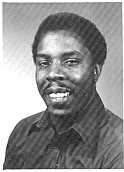
The early years of my life were
spent in Chicago where I was always
somewhat curious about human behavior.
At the age of seven, fate and a pair
of one-way train tickets brought me and
my brother to Oakland, California where
I spent the remainder of my childhood.
My interests in human behavior developed into questions
concerning heredity, intelligence and that "mysterious" IQ
score. Intelligence was thought of as a convenient yardstick
for mental ability as measured by an IQ.test. My junior high school
classmates and I were shown graphs from the results of an IQ study
which illustrated the significant differences between the mean IQ
scores obtained by blacks and whites. An innate intellectual
superiority of whites was implied by the results of this study conducted
in a so called "unbiased" community. Based on my knowledge of limited
opportunities for blacks, I could not accept these results. I felt the data reflected
racial, economical and cultural differences, rather than valid scientific or
psychological theory.
Through higher education I looked for more specific answers
and ways to help blacks cope with the academic aspects of the
problem. I attended Oakland City College for two years before joining
the Air Force. During that time, I enrolled in college classes
whenever and whereever possible. Central Michigan University brought
my first taste of psychology. There I discovered the invalidity of
the IQ studies sited during my junior high school years. Interests
up, I took additional courses through the University of Maryland,
Boise State College and Nevada Southern University. Shortly after
my military discharge I obtained my BA in Psychology from Sacramento
State College and my M.Ed. in counseling from the University of Washington.
During my Seattle experience, I was electrified by a demonstration on
self-paced learning (SPL) programs (or minicourses). My excitement
focused on the ability of some programs to handle immediate feedback,
adapt to the learning styles of fast and slow students, allow students
to meet minimum acceptable performance levels without penalty and allow
the instructor freedom to inform, advise and motivate.
One of my personal objectives at Evergreen is to aid in the
construction of quality programs in the areas of science, math and
other feasible subject areas. Hopefully, these programs would be
fascinating enough and rewarding enough to generate minority student involvement.
Of course, these programs would be of general student
interest and benefit. I believe that when a sufficient number of
quality SPL programs are available in various applicable subject
areas, blacks and other minorities will have a useful tool for
overcoming academic disadvantages.